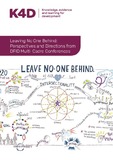Leaving No One Behind: Perspectives and Directions from DFID Multi-Cadre Conferences
Abstract
This report is on two DFID multi-cadre conferences that explored how strengthening a development focus on leaving no one behind (LNB) improves the lives of people living in extreme poverty and marginalisation. The conferences brought together over 220 advisers from across the livelihoods,
social development, infrastructure, and climate and environment cadres. The purpose of this report is to share the outcomes and process of the conferences with colleagues in DFID and partner organisations. The conferences provided an innovative and interdisciplinary space for peer learning and led to a shared understanding of how the LNB agenda could be progressed within DFID, with partners and within cadre groups. LNB is a core commitment of the Sustainable Development Goals (SDGs) and a key priority for DFID, with the UK Government having been a very strong advocate for embedding this concept in the SDGs. The conferences explored the implications of LNB for economic development, building stability and increasing resilience, with attention to the crosscutting issues of gender, disability, digital access, and migration. They were innovative in the way they integrated collaborative facilitation processes and visual recording within an overall framework of scenario analysis. The design aimed to optimise peer-to-peer sharing and learning while working towards a collective understanding of how to accelerate progress on the LNB agenda. Central to the discussions was the concept of intersectionality, i.e. recognition that extreme poverty and marginalisation must be viewed from the intersection of multiple interacting social, political, and economic factors. In seeking solutions, it makes little sense to focus on one group or one form of exclusion without considering the wider context of interacting forms of exclusion.
Citation
Herbert, S. (2019). Leaving No One Behind: Perspectives and Directions from DFID Multi-Cadre Conferences. K4D Emerging Issues Report. Brighton, UK: Institute of Development Studies.Is part of series
K4D Emerging Issue Report;014Rights holder
© DFID - Crown copyright 2019Collections
- K4D [937]

